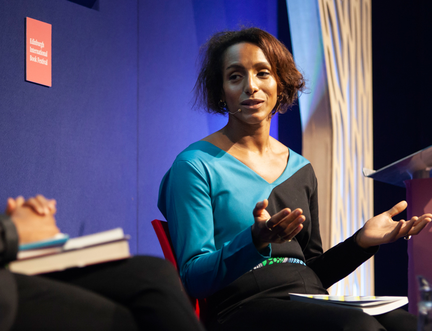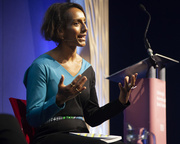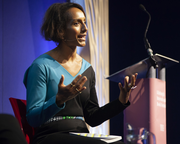More articles Wednesday 15 August 2018 1:00pm
Britain needs to overcome a ‘wilful ignorance’ about its racial history, says Afua Hirsch

Britain has allowed itself “to become very fragile in confronting elements of the historical record that are inconvenient,” according to the writer, broadcaster, former barrister and 2018 Book Festival Guest Selector Afua Hirsch. Speaking with journalist and author Chita Ramaswamy at the Festival yesterday, Hirsch pointed out that only last year several tabloid newspapers described her as “the woman who wants to destroy British history” — simply for writing an article highlighting the links between Lord Nelson, the hero of Trafalgar, and slavery in the Caribbean.
“It’s so ironic,” she said. “I want to remember history, not to erase it. I want us to engage with history more fully.”
Hirsch was primarily talking about the issues raised by her recent book Brit(ish), a highly personal view of race and identity in Britain today. “When I wrote my book in late 2015 - early 2016, I was hypothesising that if we are not willing to have a genuine understanding of our past, how we built this nation to the place that it is, it creates a fragility,” she said.
“On the one hand, we can’t cope with our reality, which is that we are a multicultural country, for a reason that is part of modern history. On the other, it also feeds this nostalgia, this willingness to go back to a past that didn’t actually exist, but which people like to imagine did.”
She suggested that a recent example of this was seen in the film The Darkest Hour. “There’s this idea of Churchill and Britain being completely alone, a vulnerable small North Atlantic nation facing all of these Axis powers,” she said. “We were on top of an Empire! We had Indian soldiers, Canadian shipping, Australian food; we had tens of thousands of African people, millions of pounds worth of gold, and we used this very directly in the war effort. Yet we continue to put out propagandist material that none of this existed.
“I find that very dangerous; it feeds this nostalgia. We’re now trying to get back to this supposed, imagined, isolated small, totally cut-off North Atlantic country, which we never were. In a very direct way, it’s encouraged the myth that some people now are trying to turn into a reality.”
Hirsch suggested that the “fragility” she wrote about manifested itself in the most direct way in Brexit. “We can all argue about Brexit, but one thing that I don’t think anyone can deny is that Brexit is about identity,” she said. “It is about what kind of country we want to be, and how we see ourselves.”
Recognising the part race plays in that is problematic when many refused to see race as a problem. “Nobody would ever hold up the US as a racial utopia,” Hirsch added, “but I feel as if in the US they’re having an argument about inequality and racism. Often, in Britain, we’re having an argument about whether we can have an argument.
“I’m often still having to justify the fact that this conversation even needs to take place, that it’s OK to write about these things and use this language. I feel that changing; I feel that argument making progress. So, minor steps, but it really matters.”
Look, Listen & Read
- 2026 Festival:
- 15-30 August
Latest News
 Major new partnership with Celtic Connections
Major new partnership with Celtic Connections






